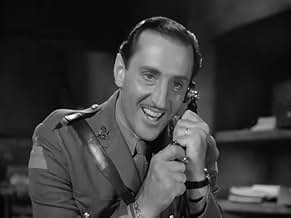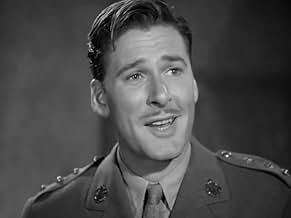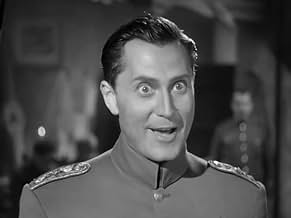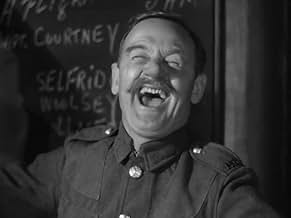IMDb RATING
7.5/10
3.6K
YOUR RATING
British flying aces in World War I contend with the harsh realities of war.British flying aces in World War I contend with the harsh realities of war.British flying aces in World War I contend with the harsh realities of war.
- Awards
- 2 wins total
Sidney Bracey
- Major Brand's Orderly
- (as Sidney Bracy)
Hal Brazeale
- Gregory
- (uncredited)
Tyrone Brereton
- Orderly
- (uncredited)
Richard Deane
- 'B' Flight Replacement
- (uncredited)
Featured reviews
10mlktrout
I first saw this movie when I was 16, and didn't understand a lot of its subtleties; I just thought it was an exciting & dramatic war film with a lot of great flying sequences. I caught it again when I was 34 and was surprised at its depth.
I like to watch this movie whenever my own job gets crazy and hectic, with unrealistic deadlines and insufficient support, because it reminds me that I really don't have it so bad after all. The men in this movie were sent up daily in obsolete equipment in a bad state of disrepair; as the film progressed the squadron had about a 70% turnover as the combat veterans were shot down and replaced by green kids whose limited training could not possibly have prepared them for what they would face.
The characters are all dissected, even lesser, supporting roles receive excellent character studies, and the stars of course are downright fascinating. It's a thrill to learn that Errol Flynn (Captain Courtney) really could act, as well as just jump around and wave a sword; David Niven is wonderfully innocent and almost childlike as "Scotty," and Basil Rathbone, a truly great actor who seldom got the chance to strut his stuff since he was usually typecast as a "bad guy" or as Sherlock Holmes, gives a nerve-wrenching performance as Major Brand, who's floundering under the strain. He proves a profound point -- it is often easier to go to your own death than to order others to do so, a lesson Captain Courtney and Lt. Scott must reluctantly learn as well.
I'm now 44, and have seen this movie a couple dozen times, but it never ages. The flying sequences are still exciting; the chivalry and wild antics of the fliers never becomes tiresome or old, and the anguish of war is still as heartbreaking. Truly a movie that will last.
I like to watch this movie whenever my own job gets crazy and hectic, with unrealistic deadlines and insufficient support, because it reminds me that I really don't have it so bad after all. The men in this movie were sent up daily in obsolete equipment in a bad state of disrepair; as the film progressed the squadron had about a 70% turnover as the combat veterans were shot down and replaced by green kids whose limited training could not possibly have prepared them for what they would face.
The characters are all dissected, even lesser, supporting roles receive excellent character studies, and the stars of course are downright fascinating. It's a thrill to learn that Errol Flynn (Captain Courtney) really could act, as well as just jump around and wave a sword; David Niven is wonderfully innocent and almost childlike as "Scotty," and Basil Rathbone, a truly great actor who seldom got the chance to strut his stuff since he was usually typecast as a "bad guy" or as Sherlock Holmes, gives a nerve-wrenching performance as Major Brand, who's floundering under the strain. He proves a profound point -- it is often easier to go to your own death than to order others to do so, a lesson Captain Courtney and Lt. Scott must reluctantly learn as well.
I'm now 44, and have seen this movie a couple dozen times, but it never ages. The flying sequences are still exciting; the chivalry and wild antics of the fliers never becomes tiresome or old, and the anguish of war is still as heartbreaking. Truly a movie that will last.
DAWN PATROL was a forerunner of the "men facing war" kind of dramas that became a steady source of entertainment in books and films of the decades that followed, particularly after WWII.
But this takes place during World War I in 1915, when aviation was still young and men in the flying machines were sent into battle against greater odds than anyone could imagine.
Basil Rathbone plays the commander breaking under pressure who has to see young men under his command die in battle against the Germans. He is delighted to be relieved of his command by the young flier who has been chiding him for sending inexperienced men into battle--Errol Flynn.
Flynn soon finds himself hounded by the same sort of pressures facing Rathbone. His best friend (David Niven) is a fun loving pal who has a change of heart when his younger brother (well played by Morton Lowry), turns up for immediate duty despite a scant amount of training. Under Flynn's orders, the boy goes into battle the following day and is killed. This event sets up the dramatic conclusion which has Flynn willing to sacrifice himself and single-handedly take on a most dangerous mission across enemy lines.
Edmund Goulding keeps the story going from one excellent scene to another and all of the performances are first rate. Donald Crisp is less stuffy than usual in a good supporting role.
But it's Errol Flynn who makes the strongest impression in a role that calls for some fine moments of acting. His emotions seem genuine and his performance is crisp and mature. Indeed, one of his best performances in a well written role.
The ultimate message of the film is the anguish and futility of war and it comes across without being preachy. Definitely a Flynn film that is well worth watching.
But this takes place during World War I in 1915, when aviation was still young and men in the flying machines were sent into battle against greater odds than anyone could imagine.
Basil Rathbone plays the commander breaking under pressure who has to see young men under his command die in battle against the Germans. He is delighted to be relieved of his command by the young flier who has been chiding him for sending inexperienced men into battle--Errol Flynn.
Flynn soon finds himself hounded by the same sort of pressures facing Rathbone. His best friend (David Niven) is a fun loving pal who has a change of heart when his younger brother (well played by Morton Lowry), turns up for immediate duty despite a scant amount of training. Under Flynn's orders, the boy goes into battle the following day and is killed. This event sets up the dramatic conclusion which has Flynn willing to sacrifice himself and single-handedly take on a most dangerous mission across enemy lines.
Edmund Goulding keeps the story going from one excellent scene to another and all of the performances are first rate. Donald Crisp is less stuffy than usual in a good supporting role.
But it's Errol Flynn who makes the strongest impression in a role that calls for some fine moments of acting. His emotions seem genuine and his performance is crisp and mature. Indeed, one of his best performances in a well written role.
The ultimate message of the film is the anguish and futility of war and it comes across without being preachy. Definitely a Flynn film that is well worth watching.
Warner Brothers more than most of the other major studios had a habit of simply recycling the old plots of their films and repackaging them. A good example would be the boxing film Kid Galahad remade a few years later as The Wagons Roll at Night with the setting now changed to a circus. But in this case we didn't get a remake of The Dawn Patrol, we got practically a carbon copy.
I finally saw the original The Dawn Patrol that was made in 1930 by Howard Hawks and found that this film was practically a word for word remake of the Hawks classic. Of course it was no surprise to learn that all the aviation sequences were just lifted bodily from the first film, but probably more than that was done. Several long-shots looked exactly the same.
In a way this might have worked out because director Edmund Goulding who was not known for action films could concentrate on the actors and he got very good performances out of Errol Flynn, David Niven, and Basil Rathbone who step into the parts that Richard Barthelmess, Douglas Fairbanks, Jr., and Neil Hamilton did the first time around.
Still after seeing first one version, than the other, one might be complaining of double vision at that.
I finally saw the original The Dawn Patrol that was made in 1930 by Howard Hawks and found that this film was practically a word for word remake of the Hawks classic. Of course it was no surprise to learn that all the aviation sequences were just lifted bodily from the first film, but probably more than that was done. Several long-shots looked exactly the same.
In a way this might have worked out because director Edmund Goulding who was not known for action films could concentrate on the actors and he got very good performances out of Errol Flynn, David Niven, and Basil Rathbone who step into the parts that Richard Barthelmess, Douglas Fairbanks, Jr., and Neil Hamilton did the first time around.
Still after seeing first one version, than the other, one might be complaining of double vision at that.
Clear eyed depiction of the cost and dangers for bombers during wartime. Errol Flynn is very good, a reminder that he was excellent not only in period pictures and westerns but quite capable in modern dress dramas. Strong supporting cast helps with Basil Rathbone standing out as a man who understands but is troubled by the weight of his duty even while others do not and is compassionate enough when the that weight has shifted to offer solace. David Niven's star moved much higher with his performance here, it would still be a few years before he moved into the top ranks but he was done with unimportant roles from this point on. Goulding's direction is steady and assured.
This is a stirring and exciting story of the courage shown by pilots who know they or their friends will likely be killed on one of their missions, and the anguish their commanders feel when sending them to their deaths. Set on the battlefields of WWI, the plot duplicates the 1930 version starring Douglass Fairbanks, Jr. In fact, whole sequences (especially flying scenes and the climactic attack) were lifted directly from the earlier film. (Note: although the 1930 version was originally entitled "Flight Command," and is occasionally screened under that title by TCM, IMDb also calls it "Dawn Patrol," probably to distinguish it from the 1940 Robert Taylor "Flight Command" about Navy pilots.)
Although it's a close call, I would recommend this later film over its predecessor, for the superior performances of the lead actors. Errol Flynn (as Dick Courtney) was more involving than 1930's Richard Barthelmess, a veteran actor whose performance retains the somewhat stilted quality of the silent film era. While Douglas Fairbanks Jr. was excellent in the 1930 version as pilot Doug Scott, David Niven in the same role positively sparkles in several more light-hearted, even comedic scenes. And although Neil Hamilton played Major Brand well in the original film, at least early on in the story, the role calls for a less-sympathetic performance, and who could be less sympathetic than Basil Rathbone at his sneery best?
Furthermore, current (as of 2012) releases of 1930's "Flight Command / Dawn Patrol" are not as visually clear in all scenes as the later version, and also have a lot of scratchy sounds and low rumble in the soundtrack, which are especially distracting in quieter scenes. Hopefully, remastered versions of both films will someday be available.
Still, this is only nit-picking, as both the 1930 and 1938 versions of "Dawn Patrol" are excellent. But given the choice, go with Flynn and Niven of 1938.
Although it's a close call, I would recommend this later film over its predecessor, for the superior performances of the lead actors. Errol Flynn (as Dick Courtney) was more involving than 1930's Richard Barthelmess, a veteran actor whose performance retains the somewhat stilted quality of the silent film era. While Douglas Fairbanks Jr. was excellent in the 1930 version as pilot Doug Scott, David Niven in the same role positively sparkles in several more light-hearted, even comedic scenes. And although Neil Hamilton played Major Brand well in the original film, at least early on in the story, the role calls for a less-sympathetic performance, and who could be less sympathetic than Basil Rathbone at his sneery best?
Furthermore, current (as of 2012) releases of 1930's "Flight Command / Dawn Patrol" are not as visually clear in all scenes as the later version, and also have a lot of scratchy sounds and low rumble in the soundtrack, which are especially distracting in quieter scenes. Hopefully, remastered versions of both films will someday be available.
Still, this is only nit-picking, as both the 1930 and 1938 versions of "Dawn Patrol" are excellent. But given the choice, go with Flynn and Niven of 1938.
Did you know
- TriviaAt the time this movie was filmed, Errol Flynn and David Niven shared a rented house at Malibu, which they named "Cirrhosis-by-the-Sea" because of all the hard drinking and sex they were having with several women.
- GoofsThe amount of oil and dirt on Courtney's face changes several times between scenes. The most obvious is when he goes up stairs to console another pilot who has lost a friend. As he goes up his face is slightly dirty, as he enters the room it is noticeably dirtier and when he comes back down it is much cleaner.
- Quotes
Phipps: [Opens package dropped by enemy plane] It's his helmet and goggles. It means a very gallant gentleman died this afternoon. And for what? What have all these deaths accomplished? So many fine chaps have died in this war and are going to die in future wars.
[pause]
Phipps: That's all, gentlemen.
- ConnectionsFeatured in Effets spéciaux du cinéma (1996)
- SoundtracksPoor Butterfly
(1916) (uncredited)
Music by Raymond Hubbell
Lyrics by John Golden
Played on the Grammaphone
- How long is The Dawn Patrol?Powered by Alexa
Details
- Runtime1 hour 43 minutes
- Color
- Sound mix
- Aspect ratio
- 1.37 : 1
Contribute to this page
Suggest an edit or add missing content

Top Gap
By what name was La patrouille de l'aube (1938) officially released in India in English?
Answer

































